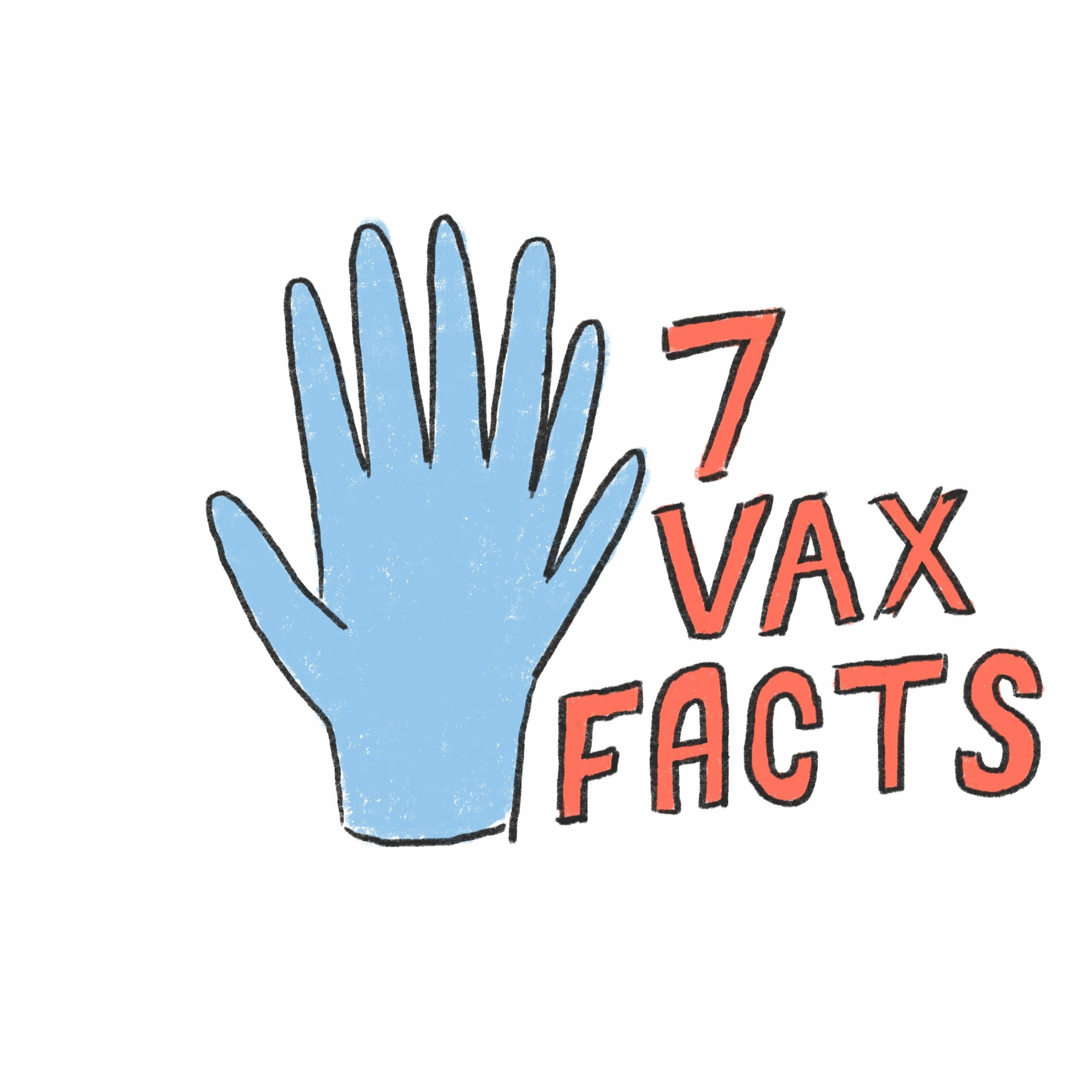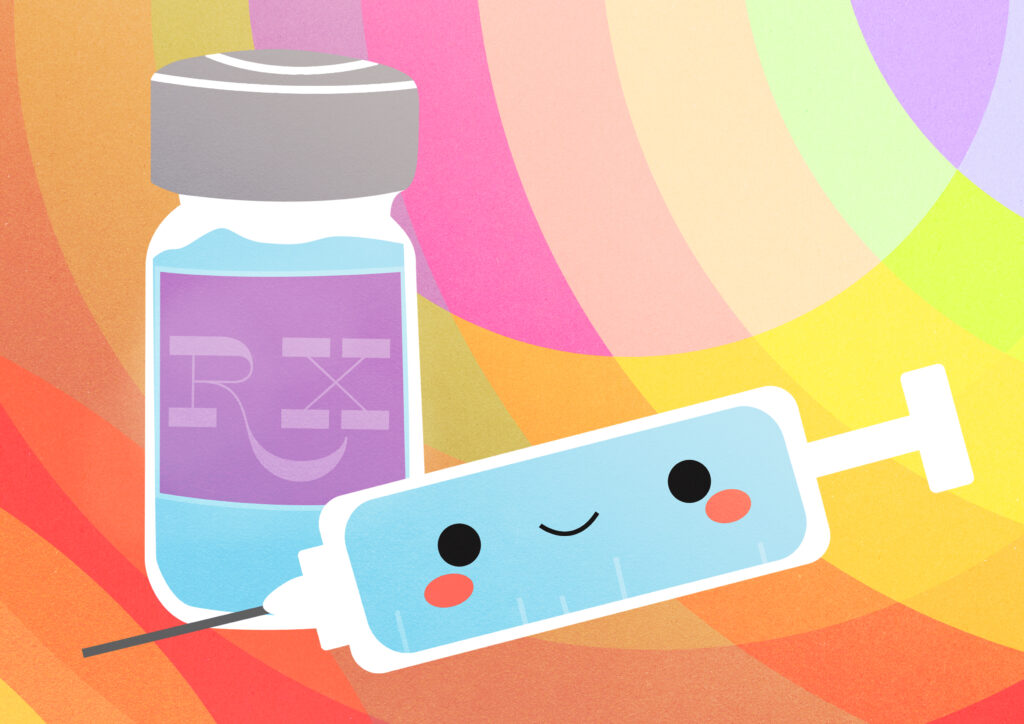
Our Editorial Team has sifted through common claims about the COVID-19 vaccine, to let you know what’s true and to debunk common myths.
Getting a shot can be scary. That’s always been true, but during COVID-19, anxiety is extra-high. Part of the issue is the mixed messages you might get from friends, family, and the news. It can be hard to understand what is true or false about COVID-19 vaccination.

Are you concerned about getting vaccinated? Are you seeing a lot of discouraging headlines? The Kidizenship Editorial Team understands where you’re coming from. We’ve scoured the media coverage of COVID-19 and examined the myths and facts to help you navigate the confusing info that’s out there.
- TRUE OR FALSE? Getting vaccinated means being injected with COVID-19, which might make the average person really sick.
ANSWER: FALSE.
HERE’S WHY: When formulating vaccines, scientists create imitations of parts of viruses. Those replicas give your body the tools you need to fight against the virus WITHOUT getting you really sick.
Some COVID-19 vaccinations, like those from companies Pfizer and Moderna, put genetic material called mRNA into your body. mRNA works like a tiny blueprint that shows the proteins in your body how to build something new on the surface of your cells. That mRNA breaks down as your body learns how to protect itself, and the second dose of the vaccine gives your immune system extra practice.
Vaccines are basically training wheels for your immune cells, the little pieces that make up your immune system and protect you from all of the nasty stuff in this world that might get you sick.
SOURCES: “Understanding how COVID-19 Vaccines Work” from the Centers for Disease Control and Prevention (CDC), “How do vaccines work?” from the World Health Organization
2) TRUE OR FALSE: The vaccine will put a microchip into your body.
ANSWER: FALSE
HERE’S WHY: One in five Americans currently believe that COVID-19 vaccinations contain microchips. This is not how the vaccine works! In fact, this myth, which was circulated on some news outlets, has been exposed as a conspiracy theory.
One helpful source for verifying information in the news is this Reuters guide: Fact Checking Methodology.
SOURCE: “False claim: Bill Gates planning to use microchip implants to fight coronavirus” from Reuters
3) TRUE OR FALSE? Getting vaccinated means that bits of the vaccine could infect those around you—in a process called “viral shedding.” It could even put your family at greater risk.
ANSWER: FALSE.
HERE’S WHY: It is impossible for a vaccine to shed pieces of COVID-19 off of vaccinated individuals, because the vaccine never puts the COVID-19 virus into your body, as explained above. It’s like showing your immune cells a picture of COVID-19, so if they encounter the virus in the wild, they know what it looks like and how to respond.
SOURCES: “Understanding Viral Vector COVID-19 Vaccines” from the CDC, “The different types of COVID-19 vaccines” from the WHO
4) TRUE OR FALSE? The testing of COVID-19 vaccines was sped up, so the vaccines aren’t reliable.
ANSWER: FALSE.
HERE’S WHY: COVID-19 vaccines were developed so quickly because the entire world wanted to get out of the pandemic! This meant that money for science research was coming in from every direction. Also, scientists were already studying viruses similar to COVID-19.
The standard of safety for COVID-19 vaccine approval was not different from what it has been for other vaccines of our time. Scientists did not shorten any part of the trial process, and no COVID-19 vaccine has ever been authorized for distribution in the United States without passing robust clinical trials.
SOURCES: “Safety of COVID-19 Vaccines” from the CDC, “Safety of COVID-19 Vaccines” from the WHO
5) TRUE OR FALSE? Because of the new variants, COVID-19 vaccination will not end this pandemic.
ANSWER: FALSE.
HERE’S WHY: Variant is the kind of word we used to think we’d only hear in sci-fi shows, but it’s a term that describes what happens when a virus mutates.
All viruses change constantly. For example, the structure of the flu virus changes every year—that’s why, annually, you have to get a new flu vaccine of a slightly different shape. With the flu vaccine, which is a viral vector vaccine, scientists have to try to predict how the virus will change in the future. They adjust the shot’s structure to protect against that expected flu variant.
In the words of the CDC, variants of viruses require constant observation: “Scientists monitor these changes, including changes to the spikes on the surface of the virus. By carefully studying viruses, scientists can learn how changes to the virus might affect how it spreads and how sick people will get from it.”
You’ve probably heard about several COVID-19 variants, but that’s no reason to give up the fight. As far as we can tell, the COVID-19 vaccines continue to be highly effective against variants, including the Delta variant. (For more information about this, read this article from Yale Medicine.)
Vaccines are never a guarantee that you won’t get sick, but they offer crucial protection that sways the odds in your favor, Hunger Games-style.
REMEMBER: Variants don’t mean that the pandemic as we know it now will last forever. The number of COVID-19 variants will increase over time. This will result in higher risk for unvaccinated people. Since vaccinated people’s immune systems have already developed protection against COVID-19, variants pose the greatest threat to unvaccinated groups.
Decreasing the rate of mutation by creating larger areas where more people are vaccinated is the end result vaccines will help us reach. It’s like having more people in your Houseparty call or more Snaps to keep up your streaks in order to combat loneliness when you can’t socialize in person.
SOURCES: “About Variants of the Virus that Causes COVID-19” from the CDC, “5 Things To Know About the Delta Variant” from Yale Medicine
6) TRUE OR FALSE? I’m young, so COVID-19 wouldn’t affect me that much, anyway.
ANSWER: FALSE.
HERE’S WHY: You can still get sick from COVID-19 even if you’re young. While it is true that young people often experience less-intense COVID-19 symptoms, often doesn’t mean always. And even if you don’t get sick, you could pass the virus to someone who’s older or less healthy than you.
And who doesn’t hate being sick? COVID-19 vaccines are distributed for free across the country. You’ll never need to pay for one, and if someone asks you to, that’s a good sign it’s a scam!
SOURCE: “Coronavirus and COVID-19: Younger Adults Are at Risk, Too” from Johns Hopkins Medicine, “Learn More About COVID-19 Vaccines From the FDA” from the FDA
7) TRUE OR FALSE? My parents don’t want me to get the COVID-19 vaccine, so I can’t.
ANSWER: BOTH: TRUE, in SOME STATES, but FALSE in OTHERS.
HERE’S WHY: Getting this information used to be a challenging research task. Now, it’s all in one place. Enter Kelly Danielpour, the incredible KIDIZEN responsible for founding Vaxteen, a database for students interested in learning more about vaccines in general, Consent Laws by State or figuring out how to talk to ‘anti-vax’ parents about vaccinations.
SOURCE: Vaxteen



